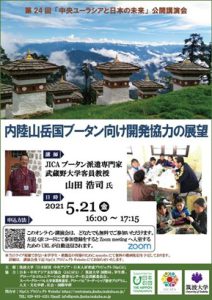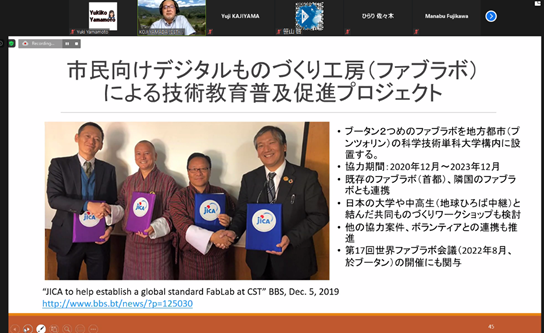The 24th Public Lecture Series, “The Future of Central Eurasia and Japan,” was held on May 21, 2021. The guest speaker, Dr. Koji Yamada, a dispatched expert of JICA in Bhutan and a visiting professor at Musashino University, gave a lecture entitled “Prospects for Development Cooperation for Bhutan, an inland mountainous country.” This event was the first lecture of the 2021 academic year, and more than 70 people attended it, including members of the University of Tsukuba and others. Moreover, this lecture was organized from overseas for the first time in the public lecture series, and the speaker joined the lecture from Bhutan.

Dr. Yamada has been involved in international cooperation in Bhutan and other Asian countries such as Nepal and India through JICA’s projects. In his presentation, he spoke about his experience as the head of the JICA Bhutan Office for three years from 2016 and his efforts in local development cooperation. Based on the recent trends and issues in development cooperation, he introduced case studies of manufacturing and education in remote areas as forms of cooperation for the rational use of local resources.
In Bhutan, improving the livelihoods of highlanders and educational opportunities for these communities are the main priorities of JICA’s activities. During the lecture, the audience had a chance to learn about a project in education called Winter Camp. This educational project was implemented on a trial basis in 2019 to support the education of children living in Lunana, one of Bhutan’s remote rural highland communities depicted in the Bhutanese film ” Bhutan Mountain classroom.” In the framework of the Winter Camp, children came down from Lunana highland to the mountainous regions during the winter. This project made it clear that there are social issues such as the acceptance of the highlanders among the Bhutanese and a lack of interaction between these communities. In addition, the Winter Camp proved that it is crucial to secure very limited human resources as teachers to continue educational activities in various areas of the country.
During the lecture, Prof. Yamada discussed the establishment of Bhutan’s first FabLab as well. FabLab is a workshop equipped with high-tech digital machinery that people can use for free. The appeal of FabLab is that it allows users to customize their manufacture and create things themselves. Moreover, it offers an opportunity to connect to the network of FabLabs around the world and get a piece of advice from experienced people. Such a project has a huge potential for a mountainous country like Bhutan with poor accessibility to rural areas.
Prof. Yamada summarized his talk and highlighted the universal value of sustainable development goals (SDGs) to leave no one behind by leading SDG-4 to provide quality education for all and SDG-9 to create the foundation for industry and technological innovation.
This lecture was available on the Manaba platform from May 24, 2021, to June 6, 2021.




